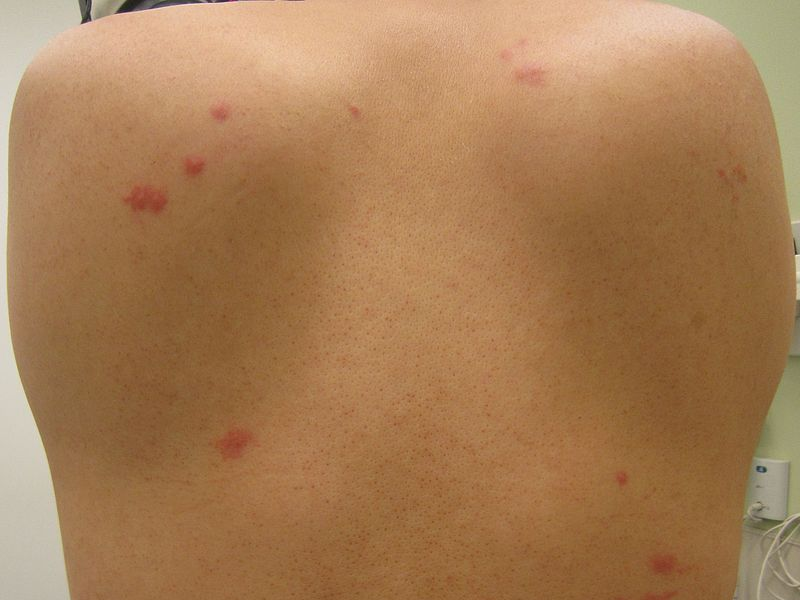- Bedbug bites and spider bites share some common symptoms.
- Both types of bites can cause redness, itching, and swelling.
- However, there are differences in where each type of bite usually occurs.
Insect bites can be unpleasant and painful no matter what critter caused them. However, suspecting that you have been bitten by bedbugs might be cause for extra alarm, as it could signal a possible infestation in your home.
Spider bites are rare, as only a few species have fangs long enough to pierce human skin, but they can cause symptoms similar to bedbug bites.
Here’s how to tell if you’ve been bitten by a spider or bedbugs.
Your bites might be caused by bedbugs if you woke up with them.

Bed bugs generally feed on human blood during the night while their host sleeps. In fact, they’re attracted to their human hosts by the carbon dioxide and body heat we emit in our sleep. Peak feeding time for bed bugs occurs between 1 a.m. and 5 a.m.
If you're waking up with bites that you didn't have the night before, you may be dealing with a bed bug problem.
Bedbug bites often appear in a line, while spider bites are usually singular.

If you notice that your skin is sporting a line of red, itchy bites, bedbugs are the likely culprits.
According to Verywell Health, bedbugs frequently appear in a line or group. This is because a single bedbug often bites its host more than once during a feeding session. bedbugs do not jump or fly, but walk across the skin.
Spiders, on the other hand, normally only bite once. Their bites are usually unintentional and in response to a perceived threat.
Additionally, the NHS advised that bedbug bites are most frequently found on the neck, hands, face, and arms. Spider bites may occur anywhere on the body.
Spider bites frequently leave distinct puncture marks.

According to the National Health Service (NHS), spider bites usually leave tiny puncture marks on the skin which can often be seen with the naked eye. These puncture marks may appear side by side.
In contrast, bedbug bites normally appear as small red dots that may swell or itch, especially if you have been bitten by bedbugs before. The bites may also have dark red centers, but puncture marks are usually not evident.
Bedbug bites may be an ongoing problem, while spider bites are usually a one-time occurrence.

According to Mayo Clinic, symptoms of a typical spider might may include red or inflamed skin around the bite site. The bite may also be itchy. In most cases, common spider bites tend to heal within a few days and do not cause any further symptoms.
In the case of bed bugs, you may notice new bites each day or every few days as the bedbugs continue to multiply and feed.
Bedbugs aren't dangerous, but some spider bites can cause serious symptoms.

Though they're commonly associated with dirty surroundings, bedbugs do not transmit diseases to humans and are just as likely to take up residence in a clean home as a filthy one.
In contrast, a very small proportion of spiders can inflict venomous bites. According to Mayo Clinic, of the thousands of spider species on Earth, only a few have fangs long enough and venom strong enough to inflict a dangerous bite on a human.
In the US, venomous spiders include the black widow spider and the brown recluse spider. Venomous spiders in the UK include the cellar spider, the woodlouse spider, and the false widow spider.
However, the bite of certain venom spiders such as the black widow or brown recluse can cause severe abdominal, back, or chest pain. You might also experience fever, chills, cramping, and excessive sweating.
In very rare cases, the skin around the bite site may die within a few hours or the bite site may develop into an open ulcer. Some people may also have an allergic reaction to a spider bite that could compromise their ability to breathe. You should seek immediate medical care if you notice any of these serious symptoms.
Though bedbug bites themselves are not dangerous, an infestation can cause significant psychological stress and even lead to insomnia.
If you suspect you have been bitten by bedbugs, take steps to check your home for signs of an infestation.

A bedbug infestation can progress rapidly, so it's important to take aggressive steps to stop the problem early on.
If your doctor agrees that your bites are probably related to bedbugs, contact a pest control group and check your home for signs of bedbugs. These can include brown spots or insect parts on mattresses, sofas, carpets, or curtains. If you find signs of an infestation, your best bet is to employ professional help rather than trying to deal with the problem alone.
Visit INSIDER's homepage for more.

